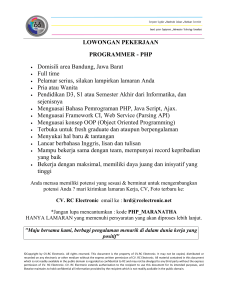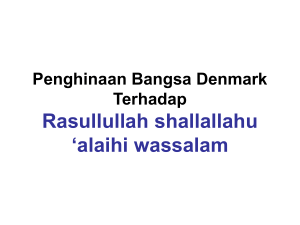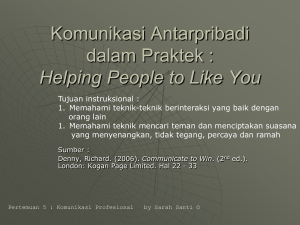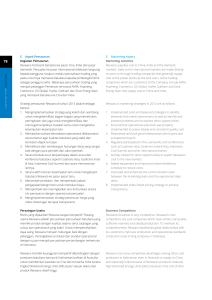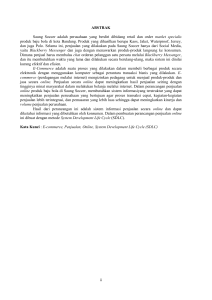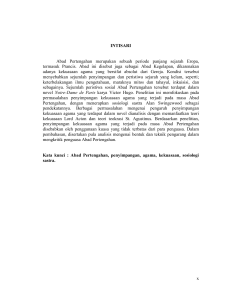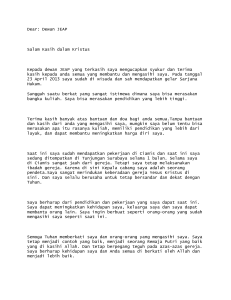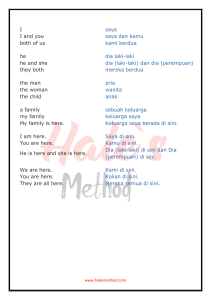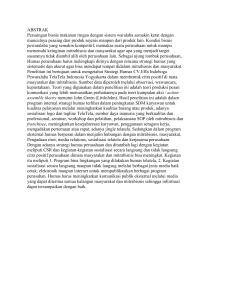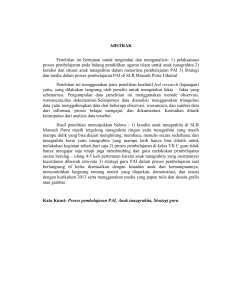God Needs No Defense - LibForAll Foundation
advertisement
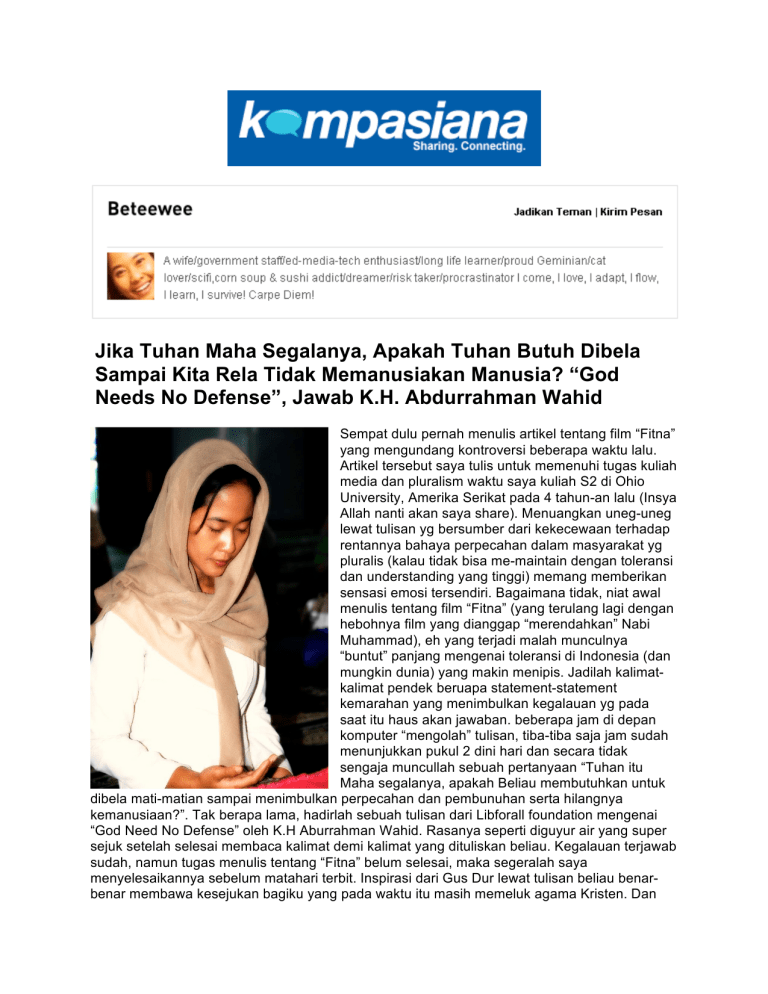
Jika Tuhan Maha Segalanya, Apakah Tuhan Butuh Dibela Sampai Kita Rela Tidak Memanusiakan Manusia? “God Needs No Defense”, Jawab K.H. Abdurrahman Wahid Sempat dulu pernah menulis artikel tentang film “Fitna” yang mengundang kontroversi beberapa waktu lalu. Artikel tersebut saya tulis untuk memenuhi tugas kuliah media dan pluralism waktu saya kuliah S2 di Ohio University, Amerika Serikat pada 4 tahun-an lalu (Insya Allah nanti akan saya share). Menuangkan uneg-uneg lewat tulisan yg bersumber dari kekecewaan terhadap rentannya bahaya perpecahan dalam masyarakat yg pluralis (kalau tidak bisa me-maintain dengan toleransi dan understanding yang tinggi) memang memberikan sensasi emosi tersendiri. Bagaimana tidak, niat awal menulis tentang film “Fitna” (yang terulang lagi dengan hebohnya film yang dianggap “merendahkan” Nabi Muhammad), eh yang terjadi malah munculnya “buntut” panjang mengenai toleransi di Indonesia (dan mungkin dunia) yang makin menipis. Jadilah kalimatkalimat pendek beruapa statement-statement kemarahan yang menimbulkan kegalauan yg pada saat itu haus akan jawaban. beberapa jam di depan komputer “mengolah” tulisan, tiba-tiba saja jam sudah menunjukkan pukul 2 dini hari dan secara tidak sengaja muncullah sebuah pertanyaan “Tuhan itu Maha segalanya, apakah Beliau membutuhkan untuk dibela mati-matian sampai menimbulkan perpecahan dan pembunuhan serta hilangnya kemanusiaan?”. Tak berapa lama, hadirlah sebuah tulisan dari Libforall foundation mengenai “God Need No Defense” oleh K.H Aburrahman Wahid. Rasanya seperti diguyur air yang super sejuk setelah selesai membaca kalimat demi kalimat yang dituliskan beliau. Kegalauan terjawab sudah, namun tugas menulis tentang “Fitna” belum selesai, maka segeralah saya menyelesaikannya sebelum matahari terbit. Inspirasi dari Gus Dur lewat tulisan beliau benarbenar membawa kesejukan bagiku yang pada waktu itu masih memeluk agama Kristen. Dan yang paling penting, tulisan tersebut akhirnya menjadi salah satu sumber inspirasi saya dalam memaknai segala kejadian yang ada dalam hidup saya dan dunia ini. Sebagai catatan saja, pada tanggal 29 Juli 2011 (hari Jumat) dengan berakar pada kerinduan hati dan keyakinan nurani, saya mengucapkan kalimat syahadat; awal makna hidup saya yang baru sebagai seorang mualaf dan muslimah. Dengan disaksikan oleh rekan-rekan kantor saya terdekat di masjid Fathullah UIN Syarif Hidayatullah Tangerang, saya mengucapkan kalimat syahadat tersebut dengan tuntunan Bp. Prof. Dr. H. Abdurahman Ghazali, MA, Ustadz Nanang Syairozi, S.Sos. Jumat yang sangat indah dan menjadi titik balik dari perjalanan hidup saya, Alhamdulillah (cerita mengenai ke-mualaf-an saya dan perjalanannya akan dibahas di lain postingan ya). Intinya, pada saat saya menjadi pemeluk agama Kristen, ada banyak hal-hal baik yang nilai universalitasnya bisa tetap saya implementasikan sampai sekarang pada saat saya menjadi seorang muslim, yaitu tentang cinta kasih. Perpindahan keyakinan saya yang dari Kristiani ke Islam pun tidak mengacu pada agama mana yg paling benar atau baik. Semua agama baik, namun nurani dan hati itu tidak bisa dipungkiri. Dan Islam pun dapat lebih menjawab seluruh kegalauan saya sebelumnya yg belum sempat mendapatkan jawabannya. Pengalaman inilah yang alhamdulillah membawa saya lebih jauh mendalami makna keterbukaan, open minded, pengertian, menghargai, toleransi, dan tenggang rasa yang sejati. Apalagi pada saat di USA, saya juga berkesempatan untuk bersosialisasi dengan teman-teman yang atheist, dan yg memiliki agama serta kepercayaan yang berbeda-beda sehingga terasa benar konsep intercultural and interfaith-nya (Insya Allah hal ini juga nanti akan saya share dalam edisi postingan tersendiri ya). Bukannya tanpa halangan. Tantangan, hambatan, dan masalah itupun pasti selalu ada (namanya juga orang hidup). Namun semua itu, semoga tidak menjadikan kita menjadi seorang “fundamentalist buta” yang enggan untuk berpikir terbuka dan menghormati perbedaan. Seperti yang telah saya baca lewat tulisan Gus Dur “God Needs No Defense”, ternyata teman-teman kita yang “fundamentalist buta” inilah yang membuat “keruh” jagad pluralisme di dunia ini dengan ambisi dan kepentingan pribadi yang digunakan sebagai kendaraan untuk mempolitisasi agama sehingga agama bukan lagi menjadi hal yang indah lagi dan hanya jadi sebuah phobia belaka. Mengutip kata teman saya yang beragama non-muslim waktu di USA dulu “Religion is not God and God is not religion”, saya jadi lebih terinpirasi untuk terus “belajar” mencari “kebenaran” dalam hati tanpa mengatasnamakan segala keterbatasan saya sebagai manusia dibalik sebuah agama. Topik ini memang sensitif dan akan selalu seperti itu, selama kita belum bisa sepenuhnya ikhlas berpikiran terbuka. Namun demikian, semoga tulisan yang bersumber dari kegalauan dalam perjalanan hidup saya ini dapat bermanfaat dengan tidak ada maksud sama sekali untuk memojokkan atau mendiskreditkan pihak-pihak tertentu. Pada intinya, saya hanya ingin share mengenai master piece K.H Abdurrahman Wahid yang menjadi inspirasi bagi banyak orang di seluruh dunia. Berikut ini adalah transcript lengkapnya. Memang masih dalam bahasa Inggris namun dengan cara Gus Dur merangkaikan setiap kata dan kalimat, insya Allah akan mudah dipahami :) Akhir kata, semoga dapat manjadikan barokah. ======================================================================== God Needs No Defense by Kyai Haji Abdurrahman Wahid As K.H. Mustofa Bisri[1] wrote in his poem Allahu Akbar: “If all of the 6 billion human inhabitants of this earth, which is no greater than a speck of dust, were blasphemous… or pious… it would not have the slightest effect upon His greatness.” Omnipotent, and existing as absolute and eternal Truth, nothing could possibly threaten God. And asar-Rahman (the Merciful) and ar-Rahim (the Compassionate), God has no enemies. Those who claim to defend God, Islam or the Prophet are thus either deluding themselves, or manipulating religion for their own mundane and political purposes, as we witnessed in the carefully manufactured outrage that swept the Muslim world several years ago, claiming hundreds of lives, in response to cartoons published in Denmark. Those who presume to fully grasp God’s will, and dare to impose their own limited understanding of this upon others, are essentially equating themselves with God, and unwittingly engaged in blasphemy. As Muslims, rather than harshly condemn others’ speech or beliefs, and employing threats or violence to constrain these, we should ask: why is there so little freedom of expression, and religion, in the so-called Muslim world? Exactly whose interests are served by laws such as Section 295-C of the Pakistani legal code, “Defiling the Name of Muhammad,” which mandates the death penalty for “blasphemy,” which Pakistan’s Federal Shari’a Court has effectively defined as: “reviling or insulting the Prophet in writing or speech; speaking profanely or contemptuously about him or his family; attacking the Prophet’s dignity and honor in an abusive manner; vilifying him or making an ugly face when his name is mentioned; showing enmity or hatred towards him, his family, his companions, and the Muslims; accusing, or slandering the Prophet and his family, including spreading evil reports about him or his family; defaming the Prophet; refusing the Prophet’s jurisdiction or judgment in any manner; rejecting the Sunnah; showing disrespect, contempt for or rejection of the rights of Allah and His Prophet or rebelling against Allah and His Prophet.”[2] Rather than serve to protect God, Islam or Muhammad, such deliberately vague and repressive laws merely empower those with a worldly (i.e., political) agenda, and act as a “sword of Damocles” threatening not only religious minorities, but the right of mainstream Muslims to speak freely about their own religion without being threatened by the wrath of fundamentalists – exercised through the power of government or mobs – whose claims of “defending religion” are little more than a pretext for self-aggrandizement. No objective observer can deny that Pakistani society – like so many others in the Muslim world – has undergone a process of coarsening under the influence of such laws, in tandem with the rise of religious extremism and the loss of true spirituality, without which the profound meaning and purpose of Islam remain veiled from human understanding. The renowned Qur’anic injunction, “Let there be no compulsion in religion” (2:256), anticipated Article 18 of the Universal Declaration of Human Rights[3] by over 13 centuries, and should serve as a inspiration to Muslim societies today, guiding them on the path to religious freedom and tolerance. In its original Qur’anic sense, the word shari’a refers to “the way,” the path to God, and not to formally codified Islamic law, which only emerged in the centuries following Muhammad’s death. In examining the issue of blasphemy and apostasy laws, it is thus vital that we differentiate between the Qur’an – from which much of the raw material for producing Islamic law is derived – and the law itself. For while its revelatory inspiration is divine, Islamic law is man-made and thus subject to human interpretation and revision. For example, punishment for apostasy is merely the legacy of historical circumstances and political calculations stretching back to the early days of Islam, when apostasy generally coincided with desertion from the Caliph’s army and/or rejection of his authority, and thus constituted treason or rebellion. The embedding (i.e., codification) of harsh punishments for apostasy into Islamic law must be recognized as an historical and political by-product of these circumstances framed in accordance with human calculations and expediency, rather than assuming that Islam, and shari’a, must forever dictate punishment for changing one’s religion. The historical development and use of the term shari’a to refer to Islamic law often leads those unfamiliar with this history to conflate man-made law with its revelatory inspiration, and to thereby elevate the products of human understanding – which are necessarily conditioned by space and time – to the status of Divine. Shari’a, properly understood, expresses and embodies perennial values. Islamic law, on the other hand, is the product of ijtihad (interpretation) which depends on circumstances (al-hukm yadur ma‘a al-‘illah wujudan wa ‘adaman) and needs to be continuously reviewed in accordance with ever-changing circumstances, to prevent Islamic law from becoming out of date, rigid and non-correlative – not only with Muslims’ contemporary lives and conditions, but also with the underlying perennial values of shari’a itself. Throughout Islamic history, many of the greatest fiqh (Islamic jurisprudence) scholars have also been deeply grounded in the traditions of tassawuf, or Islamic mysticism, and recognized the need to balance the letter with the spirit of the law. The profoundly humanistic and spiritual nature of Sufi Islam facilitated the accommodation of different social and cultural practices as Islam spread from its birthplace in the Arabian Peninsula to the Levant, North Africa, the Sahel and Sub-Saharan Africa, Persia, Central and South Asia, and the East Indies archipelago. By many estimates, a majority of the Muslim population in most of these regions still practice a form of religious piety either directly or indirectly derived from Sufism. And the greatness of traditional Islamic art and architecture – from the wonders of Fes and Grenada, to Istanbul, Isfahan, Samarkand and Agra – bears testimony to the long line of Sufi masters, guilds and individual artists who strove to ennoble matter, so as to transform our man-made environment into “the veritable counterpart of nature, a mosaic of ‘Divine portents’ revealing everywhere the handiwork of man as God’s vice-regent.”[4] Indeed, the greatness of classical Islamic civilization – which incorporated a humane and cosmopolitan universalism – stemmed largely from the intellectual and spiritual maturity that grew from the amalgamation of Arab, Greek, Jewish, Christian and Persian influences. That is why I wept upon seeing Ibn Rushd’s commentary on the Nicomachian Ethics lovingly preserved and displayed, during a visit some years ago to Fes, Morocco. For if not for Aristotle and his great treatise, I might have become a Muslim fundamentalist myself. Among the various factors which have contributed to the long decline of Arab and Muslim civilizations in general, and greatly hindered their participation in the development of the modern world, was the triumph of normative religious constraints, which ultimately defeated the classical tradition of Islamic humanism. Absorption of “alien” influences – particularly in the realm of speculative thought, and the creation of individual, rational and independent sciences not constrained by religious scholasticism – was defeated by internal control mechanisms exercised by religious and governmental authorities, thus paralyzing Muslim societies. These same tendencies are still on display in our contemporary world, not least in the form of severe blasphemy and apostasy laws that narrow the bounds of acceptable discourse in the Islamic world, and prevent most Muslims from thinking “outside the box” not only about religion, but about vast spheres of life, literature, science and culture in general. Religious Understanding is a Process Anyone who is sincere in understanding his or her faith necessarily undergoes a process of constant evolution in that understanding, as experience and insights give rise to new perceptions of the truth. For as God states in the Qur’an: “We will display Our Signs upon the horizon, and within themselves (humanity), until it is clear to them that God is the Truth (alHaqq) (41:53). Nothing that exists is self-sufficient, other than God. All living things are interdependent, and owe their very existence to God. Yet because God’s creatures exist within time and space, their perceptions of truth and reality differ from one to the next, conditioned by their personal knowledge and experience. As referenced above, Islam views the world and whatever information we may obtain from it, as signs leading to knowledge of God. Muslim scholars traditionally classify three stages of knowledge: first, the science of certainty (‘ilm al-yaqin), which is inferential and concerns knowledge commonly held to be true, whether by scientists, intellectuals or ulama themselves. Second, the vision of certainty (‘ain al-yaqin) represents a higher level of truth than the first. At this stage, one directly witnesses that information about an objective phenomenon is indeed true and accurate. Third is the truth or reality of certainty (haqq al-yaqin), i.e., truth which reaches the level of perfection through direct personal experience, as exemplified by a saint’s mystical communion with God. The fact that the Qur’an refers to God as “the Truth” is highly significant. If human knowledge is to attain this level of Truth, religious freedom is vital. Indeed, the search for Truth (i.e., the search for God) – whether employing the intellect, emotions or various forms of spiritual practice – should be allowed a free and broad range. For without freedom, the individual soul cannot attain absolute Truth… which is, by Its very nature, unconditional Freedom itself. Intellectual and emotional efforts are mere preludes in the search for Truth. One’s goal as a Muslim should be to completely surrender oneself (islâm) to the absolute Truth and Reality of God, rather than to mere intellectual or emotional concepts regarding the ultimate Truth. Without freedom, humans can only attain a self-satisfied and illusory grasp of the truth, rather than genuine Truth Itself (haqq al-haqiqi). The spiritual aptitude of any given individual necessarily plays a key role in his or her ability to attain the Truth, while the particular expression of Truth apprehended by one person may differ from that of the next. Islam honors and values these differences, and religious freedom itself, recognizing that each human being comprehends God in accord with his or her own native abilities and propensities, as expressed in the Hadith Qudsi[5] “Ana ‘inda zann ‘abdi bi,” – “I am as my servant thinks I am.” Of course, one’s efforts to know God (mujahadah, from the same root as jihad) should be genuine and sincere (ikhlas), leading to a state of self-transcendence. In such a state, humans experience God’s ineffable Presence and their own annihilation. Muslim fundamentalists often reject this notion, because of their shallow grasp of religion and lack of spiritual experience. For them, God must be understood as completely transcendent (tanzih) and far beyond the reach of humanity, with no hope for anyone to experience God’s Presence. Such views are mistaken, for as the Qur’an itself states: “Whichever way you turn, there is the face of God” (2:115). Nothing can restrict the Absolute Truth. Sufism – whose purpose is to bring Muslims to the third stage of knowledge, i.e., the truth and reality of certainty (haqq al-yaqin) – emphasizes the value of freedom and diversity, both as reflections of God’s will and purpose, and to prevent the inadvertent or deliberate conflation of human understanding (which is inherently limited and subject to error) with the Divine. Faith (îmân) and surrender to God (islâm) on a purely intellectual level are not enough. Rather, a Muslim should continuously strive (mujahadah) to experience the actual Presence of God (ihsan). For without experiencing God’s Presence, a Muslim’s religious practice remains on a purely theoretical level; islâm has not yet become an experiential reality. Sanctions against freedom of religious inquiry and expression act to halt the developmental process of religious understanding dead in its tracks – conflating the sanctioning authority’s current, limited grasp of the truth with ultimate Truth itself, and thereby transforming religion from a path to the Divine into a “divinized” goal, whose features and confines are generally dictated by those with an all-too-human agenda of earthly power and control. We can see this process at work in attempts by the Organization of Islamic Conferences (OIC), the United Nations General Assembly and the UN Council on Human Rights to restrict freedom of expression and institute a legally-binding global ban on any perceived criticism of Islam, to prevent so-called “defamation of religion.” Whether motivated by sincere concern for humanity, or political calculation, such efforts are woefully misguided and play directly into the hands of fundamentalists, who wish to avoid all criticism of their attempts to narrow the scope of discourse regarding Islam, and to inter 1.3 billion Muslims in a narrow, suffocating chamber of dogmatism. While hostility towards Islam and Muslims is a legitimate and vital concern, we must recognize that a major cause of such hostility is the behavior of certain Muslims themselves, who propagate a harsh, repressive, supremacist and often violent understanding of Islam, which tends to aggravate and confirm non-Muslims’ worst fears and prejudices about Islam and Muslims in general. Rather than legally stifle criticism and debate – which will only encourage Muslim fundamentalists in their efforts to impose a spiritually void, harsh and monolithicunderstanding of Islam upon all the world – Western authorities should instead firmly defend freedom of expression, not only in their own nations, but globally, as enshrined in Article 19 of the Universal Declaration of Human Rights.[6] Those who are humble and strive to live in genuine submission to God (i.e., islâm), do not claim to be perfect in their understanding of the Truth. Rather, they are content to live in peace with others, whose paths and views may differ. Defending freedom of expression is by no means synonymous with personallycountenancing or encouraging disrespect towards others’ religious beliefs, but it does imply greater faith in the judgment of God, than of man. Beyond the daily headlines of chaos and violence, the vast majority of the world’s Muslims continue to express their admiration of Muhammad by seeking to emulate the peaceful and tolerant example of his life which they have been taught, without behaving violently in response to those who despise the Prophet, or proclaim the supremacy of their own limited understanding of the Truth. Such Muslims live in accordance with the Qur’anic verse which states, “And the servants of (Allah) the Most Gracious are those who walk in humility, and when the ignorant address them, they say ‘Peace’” (25:63). [1] Descended from a long line of charismatic religious leaders, Kyai Haji Mustofa Bisri heads the Raudlatuth Tholibin Islamic boarding school in Rembang, Central Java. Widely revered as a religious scholar, poet, novelist, painter and Muslim intellectual, K.H. Mustofa Bisri has strongly influenced the Nahdlatul Ulama’s social, educational and religious development over the past thirty years. [2] Mohammad Asrar Madani, Verdict of Islamic Law on Blasphemy and Apostasy. Lahore, Pakistan: Idara-e-Islamiat, 1994. [3] “Everyone has the right to freedom of thought, conscience and religion; this right includes freedom to change his religion or belief, and freedom, either alone or in community with others and in public or private, to manifest his religion or belief in teaching, practice, worship and observance.” [4] Seyyed Hossein Nasr in Persia, Bridge of Turquoise, 1975, New York Graphic Society. [5] Muslims regard Hadith Qudsi as the words of God, repeated by Muhammad and recorded on the condition of an isnad (chain of verification by witness(es) who heard Muhammad say the hadith). [6] “Everyone has the right to freedom of opinion and expression; this right includes freedom to hold opinions without interference and to seek, receive and impart information and ideas through any media and regardless of frontiers.”
